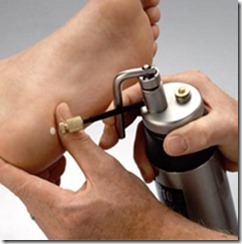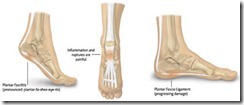 If your Christmas shopping includes getting new party clothes, choose your shoes last. Because your feet swell up during the day, always wait until later to try on shoes, or risk getting a pair that may feel fine at first, but end up tight and uncomfortable. Since your feet also get bigger over time, you may want to have them measured again. However, as various brands of shoes are sized differently, judge them on how they feel now, rather than counting on a “breaking-in” period; and try on both of them.
If your Christmas shopping includes getting new party clothes, choose your shoes last. Because your feet swell up during the day, always wait until later to try on shoes, or risk getting a pair that may feel fine at first, but end up tight and uncomfortable. Since your feet also get bigger over time, you may want to have them measured again. However, as various brands of shoes are sized differently, judge them on how they feel now, rather than counting on a “breaking-in” period; and try on both of them. Thursday, December 8, 2011
Buy Shoes that will Keep Your Feet in Good Standing
 If your Christmas shopping includes getting new party clothes, choose your shoes last. Because your feet swell up during the day, always wait until later to try on shoes, or risk getting a pair that may feel fine at first, but end up tight and uncomfortable. Since your feet also get bigger over time, you may want to have them measured again. However, as various brands of shoes are sized differently, judge them on how they feel now, rather than counting on a “breaking-in” period; and try on both of them.
If your Christmas shopping includes getting new party clothes, choose your shoes last. Because your feet swell up during the day, always wait until later to try on shoes, or risk getting a pair that may feel fine at first, but end up tight and uncomfortable. Since your feet also get bigger over time, you may want to have them measured again. However, as various brands of shoes are sized differently, judge them on how they feel now, rather than counting on a “breaking-in” period; and try on both of them. Monday, November 28, 2011
‘Tis the Season to be Kind to Your Feet
Saturday, November 19, 2011
Custom-Fit Orthotics Make the Holidays a Cakewalk
Monday, November 14, 2011
We’ll Heal Your Heel for Real
We have several ways of treating this condition, including Extracorporeal Shock Wave Therapy (ESWT). In this easy, half-hour procedure, a series of focused shock waves is delivered to the heel, triggering the formation of blood vessels that will carry nutrients to the affected area, thus stimulating the repair process.
Friday, November 4, 2011
Corn Futures on the Decline
Nevertheless, whether or not they’re harmful to your health, corns are, at least, unsightly; and they’re often painful as well. This is understandable, as they normally result from the friction of a shoe constantly rubbing against a part of the foot. When this happens, the body’s natural defenses kick in, causing the skin in the affected area to thicken. Although this is intended to protect the foot, it is, by no means, a solution. After all, the longer you ignore it, the larger the corn or callus will become; and, eventually, it will lead to an irregular gait, which will only inspire more of these protuberances to form.
Of course, you can easily prevent this situation. Just come in and see us, and we’ll nip your corn in the bud before you grow a whole crop!
Monday, October 31, 2011
Be more HANDS ON with your Foot Health
Tuesday, July 5, 2011
Neuropathy and its Treatments
The Rebuilder draws nerve endings closer together for better impulse propagation, and improves nerve transmissions. It also triggers leg muscles to contract and relax, sending blood back to the heart, while
rebuilding muscle mass and strength in legs.
For more information on this, and other foot treatments, visit the Beaver Valley Foot Clinic's website or call 724-375-1577!
Thursday, June 23, 2011
Cryotherapy at Beaver Valley Foot Clinic
This minimally invasive procedure freezes nerves, allowing ice to form around the actual nerve itself, the outer layers of the nerve sheath degenerates and, in doing so, decreases the nerve’s abilities to transmit the signal of pain. Over the course of the next couple of months, the nerve sheath regenerates again and in most cases regenerates without the inflammation and you are pain free.
Like applying an ice pack on the skin for minor aches and pains, cryotherapy has been shown to be very effective in relieving very painful foot conditions such as heel pain (plantar fasciitis), neuromas, and has been showing promising results in treating other conditions such as tarsal tunnel pain, tendonitis and may even be helpful in cases of arthritis and diabetic neuropathy. Contact the Beaver Valley Foot Clinic at 724-375-1577 today for more information or an appointment!
Thursday, June 16, 2011
Common Youth Baseball Ankle Injuries
Achilles Tendinitis: The stopping and starting creates tightness and straining in the back of the heel.
Plantar Fasciitis: A condition in which catchers are susceptible especially in the arch of the foot by squatting behind home plate for every pitch. Again, coaches should teach their catchers how to alter
their stance to vary weight displacement. A podiatric physician can evaluate arch pain and may prescribe customized shoe inserts called orthoses to help alleviate the pain.
Contusions: A baseball will inevitably make contact with a player's foot and ankle, whether it's a pitched ball, foul tip, or line drive, and sliding base runners often run headlong into a infielder's legs.
Usually this contact results in contusions, which are not often serious injuries. Ice packs and a few days' rest will usually help the contusions, or bruises, feel better.
Shin Splints: Shin splints usually stem from an inflammation of the muscle and tendon attached to the shin, caused by stress factors. Treat shin pain with cold compresses immediately after a game to
reduce inflammation. Proper stretching and strengthening exercises should prevent the onset of shin splints.
Tuesday, June 14, 2011
Tarsal Tunnel Syndrome
Our podiatrists are specially trained in the delicate procedure of triple nerve decompression which helps such symptoms as pain and tingling in the feet. Call 724-375-1577 for more information on nerve decompression to treat tarsal tunnel syndrome or visit Beaver Valley Foot Clinic's website to schedule an appointment.
Thursday, June 9, 2011
Get your Toes Ready for Sandals!
The Beaver Valley Foot Clinic has the answer for you with its fungus and wart laser removal procedure. The laser passes through the nail without damaging it, yet kills the fungus living under the nail. This new approach to solving toenail fungus is more effective than topical treatment and without the side effects of taking pills. At the time of the procedure your toenail will not become instantly clear, but as it grows, the new nail will grow out normal as a result of the death to the fungus.
Don't be afraid to wear sandals this summer, clean up your toenails with a laser treatment from the Beaver Valley Foot Clinic!
Wednesday, June 1, 2011
Injuries and Treatments Common to Many Sports
Immediate treatment is crucial to quick healing. A podiatric physician can provide treatment as well as recommend balancing and strengthening exercises to restore coordination quickly.
Fractures: Fractures from overuse in child athletes are commonly seen in podiatric medical offices. Growth plates are particularly susceptible to injuries, but mid-shaft fractures of the bone also
occur. If a fracture is not severe, rest and immobilization may be the best treatment. More complicated injuries may require casting or surgical correction. If swelling and pain persist, see a podiatric physician.
Sever's Disease: An inflammation of a growth plate, Sever’s Disease is often felt as pain behind the heel caused by inflammation of the apophysis, a growth center where a tendon is attached to the bone.
Rest, ice, and heel lifts are usually prescribed.
Shin Splints and Stress Fractures: Shin splints are microtears or inflammation of the anterior leg muscles, as are achilles tendon pulls in the posterior region of the leg. Again, rest is most important in
healing these injuries. If pain is persistent, see a podiatrist, who can recommend strengthening exercises, certain shoes, or, if indicated, prescribe custom-made shoe inserts known as orthoses.
Thursday, May 26, 2011
Neuromas
Trauma, arthritis, high-heeled shoes, or an abnormal bone structure are just some of the conditions that may cause a neuroma. Symptoms such as burning or tingling in the ball of the foot or in the adjacent toes and even numbness are commonly seen with this condition. Those suffering from the condition often find relief by stopping their walk, taking off their shoe, and rubbing the affected area. At times, you may feel the pain is similar to having a stone in your shoe.
Call us with any questions or concerns about Neuromas. Your feet aren’t supposed to hurt. Call Beaver Valley Foot Clinic today at 724-375-1577!
Thursday, May 19, 2011
Try a Variety of Activity to Keep your Children's Feet Healthy!
Physicians warn repetitive overuse can cause inflammation of the growth plates. They advise parents to promote diverse physical activities for their children rather than one sport. This is especially important with individual sports such as running, gymnastics, and tennis, which require long hours of practice.
For more tips on foot and ankle safety visit http://www.bvfootclinic.com/
Friday, May 13, 2011
Regenerative Injection Therapy, Platelet Rich Plasma Treatment
Tendons and ligaments are responsible for providing motion across joints and stabilizing these joints. With chronic repetitive use, our tendons and ligaments are susceptible to injury. Because they have a relatively poor blood supply the healing process can be difficult. Eventually, small tears occur. This is referred to as tendinosis.
Traditionally, anti-inflammatory medication has been used to tendon and ligament pathology. Once the injury has progressed to the stage of tendinosis these medications are often ineffective. In addition, prolonged use of these medications is not without side effects. Cortisone injections have a potent anti-inflammatory effect and can provide considerable relief. However, they do not provide long term healing and repeated use of cortisone can actually further weaken tendons and ligaments.
Platelet Rich Plasma (PRP) is an effective treatment for tendon and ligament injuries. PRP is blood plasma with concentrated platelets. The concentrated platelets in PRP contain huge reservoirs of growth factors that promote and accelerate the healing process.
Thursday, May 5, 2011
Proper Footwear for your Active Child
Improper footwear can lead to foot and ankle injuries for your active children. The Beaver Valley Foot Clinic recognizes the importance of proper footwear, and has some tips on how to make sure your young athlete stays healthy.
Because a child's feet are constantly growing, it is important to allow at least one finger's width from the end of the longest toe when buying shoes. Remember, proper fit is very important. You can have the best shoe in the world, but if it doesn't fit right, it doesn't do its job.
In the shoe store, children should put on both shoes, with their athletic socks and the laces tied tight, for several minutes to properly check the shoes' fit. Shop for shoes in the afternoon, when the feet are naturally slightly swollen.
In young children, an "all purpose" sports shoe works well for most sports. A running-specific shoe is not suitable as an all purpose shoe; moving laterally in a running shoe is more difficult and presents greater risk of injury for children. After the age of 10, sport-specific shoes can help improve performance and protect the feet.
Stay tuned for more tips on footwear for your active child from BVFC.
Friday, April 29, 2011
Ingrown Toenail Treatment
What are ingrown toenails?
An ingrown nail is the result of a nail growing into the skin that surrounds it. This often occurs at either edge of the big toe. Ingrown nails may be caused by improper trimming, inherited nail deformities, injuries, fungal infections, or pressure.
What do we do?
While many people have various home treatments for ingrown toenails they do not always prove to be effective. Our simple 5 minute procedure will permanently fix your ingrown toenail and leave
you free of discomfort and unsightly toe issues. Call today for an appointment at (724)-375-1577.
Tuesday, April 19, 2011
Meet Dr. Christina Teimouri (Certified Cryostar Surgeon)
Dr. Christina has been treating those with toenail problems, sprains, breaks, hammertoes, heel spurs, corns, calluses, diabetic and arthritic conditions for more than 16 years. Dedicated to offering the latest in podiatric advances, Dr. Christina is the source for revolutionary treatments like Extracorporeal Shock Wave Therapy, new Radio Surgery, and Cryosurgery. Dr. Christina Teimouri is Board Certified by the American Board of Podiatric Surgery and a member of the American Podiatric Medical Association. Dr. Teimouri is a Certified Cryostar Surgeon, and Lectures at various seminars about the Cryostar Cryoanalgesia System. She is also a certified instructor in Extracorpal Shockwave Therapy, ESWT, for the treatment of Plantar Fasciitis, or heel spur syndrome.
But along with receiving the most advanced care, you will take a step back in time. To a time when a patient received unhurried one-on-one care from their personal Doctor. And this is Dr. Christina Teimouri's way: the old-fashioned way.
Wednesday, April 13, 2011
Meet Dr. Quattrone
Dr. Quattrone DPM has many years of extensive clinical and surgical experience and enjoys working with patients of all ages and backgrounds. He is Board Certified both in Surgery by ABPS and in Wound Care. He trained at Johns Hopkins University under the well-respected Dr. A. Lee Dellon MD. He has been successfully performing the triple nerve decompression technique for diabetic neuropathy for many years. He is a big sports fan, so he understands the toll athletics and sporting activities can take on one's feet. He stays active by exercising and helps coach his son's football and baseball teams.
Thursday, April 7, 2011
Do you suffer from heel pain, Morton's Neuroma, Plantar Fasciitis, Diabetic Neuropathy or Fibromas?
Do you suffer from heel pain, Morton's Neuroma, Plantar Fasciitis, Diabetic Neuropathy or Fibromas? Cryosurgery can help with all of these! It's a six minute office procedure with a high success rate allowing you to walk out of the office ,shower the next day and not miss any work! How it works is by having the ice form around the actual nerve itself, the outer layers of the nerve sheath degenerates and, in doing so, decreases the nerve’s abilities to transmit the signal of pain. Over the course of the next couple of months, the nerve sheath regenerates again and in most cases regenerates without the inflammation and you are pain free. This unique therapy has been showing promising results in treating other conditions such as Tarsal Tunnel pain, Tendonitis and may even be helpful in cases of Arthritis and Diabetic Neuropathy. Call 724-375-1577 for an appointment.
Monday, April 4, 2011
Introducing our new Facebook, Twitter, and Blog pages
We have a new blog, Twitter, and Facebook page to keep everyone up to date on news and events. To stay updated, please check out our profiles:
Follow our blog's RSS feed:
Become a Fan on Facebook by clicking the "Like" button:
Follow us on Twitter:
Thanks for checking out our profiles. We are excited to be able to stay in touch with everyone so easily in the future!
Are you suffering from Chronic Plantar Fasciitis? We can help!
Are you suffering from Chronic Plantar Fasciitis? Then come on in to the Beaver Valley Foot Clinic for Extracorporeal Shock wave Therapy. Extracorporeal shock wave therapy, or ESWT, is a treatment option for patients with chronic plantar fasciitis. ESWT delivers focused shock waves to the heel inducing microtrauma to the tissue that is affected by plantar fasciitis and initiating a healing response by the body. The Healing response causes blood vessel formation and increased delivery of nutrients to the affected heel thereby stimulating the repair process and relieving the symptoms of plantar fasciitis.
Benefits of ESWT
- Risks of surgery eliminated
- A proven pain relief procedure
- Patients can walk immediately
- 30-minute in-office procedure
- No time off work
- No pain medication



















